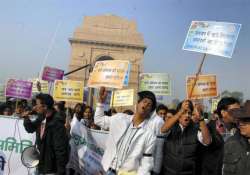Delhi High Court asks police, why prohibitory orders imposed at India Gate
New Delhi, Jan 8: The city police was asked today by the Delhi High Court to explain as to how a special executive magistrate can be vested with the power to impose prohibitory orders under

New Delhi, Jan 8: The city police was asked today by the Delhi High Court to explain as to how a special executive magistrate can be vested with the power to impose prohibitory orders under section 144 of CrPC for up to six months despite the same being contrary to the fundamental rights of citizens.
"Issue notice (to Delhi Police). You file your counter within two weeks as to how the government can delegate the power to invoke section 144 of Criminal Procedure Code (CrpC) for a period extending up to six months.
"You can't uniformly, just like that, extend the operation of section 144 as it is in contrast with the fundamental rights of the citizens," said a bench headed by Chief Justice D Murugesan.
The court, which had fixed the matter for today for issuing directions on a plea for framing guidelines for imposing prohibitory orders under the CrPC, issued the notice to Delhi police and asked it to file a detailed reply. The court slated the matter for further hearing on February 6.
Refusing to frame guidelines, the bench, also comprising Justice V K Jain, however, said, "We will certainly look into the delegation of power to the special executive magistrate (SEM) to impose section 144 of CrPC.
"We will deal with the material (necessary for invoking the provision). We are concerned with the application of mind (by SEM) before passing such an order."
The counsel appearing for Delhi police, meanwhile, told the court that the prohibitory orders imposed on December 22 at India Gate and adjoining areas is to expire on January 14.
Faced with sudden upsurge against the December 16 gang rape of a paramedical student in a moving bus here, the police had invoked section 144 CrPC to maintain public tranquillity and smooth traffic flow in and around India Gate here.
"Issue notice (to Delhi Police). You file your counter within two weeks as to how the government can delegate the power to invoke section 144 of Criminal Procedure Code (CrpC) for a period extending up to six months.
"You can't uniformly, just like that, extend the operation of section 144 as it is in contrast with the fundamental rights of the citizens," said a bench headed by Chief Justice D Murugesan.
The court, which had fixed the matter for today for issuing directions on a plea for framing guidelines for imposing prohibitory orders under the CrPC, issued the notice to Delhi police and asked it to file a detailed reply. The court slated the matter for further hearing on February 6.
Refusing to frame guidelines, the bench, also comprising Justice V K Jain, however, said, "We will certainly look into the delegation of power to the special executive magistrate (SEM) to impose section 144 of CrPC.
"We will deal with the material (necessary for invoking the provision). We are concerned with the application of mind (by SEM) before passing such an order."
The counsel appearing for Delhi police, meanwhile, told the court that the prohibitory orders imposed on December 22 at India Gate and adjoining areas is to expire on January 14.
Faced with sudden upsurge against the December 16 gang rape of a paramedical student in a moving bus here, the police had invoked section 144 CrPC to maintain public tranquillity and smooth traffic flow in and around India Gate here.